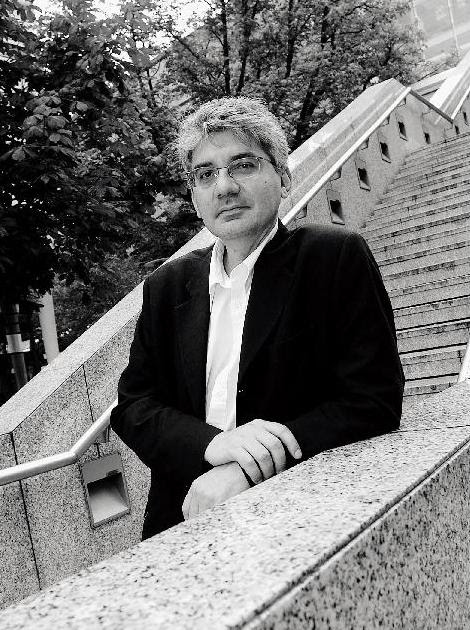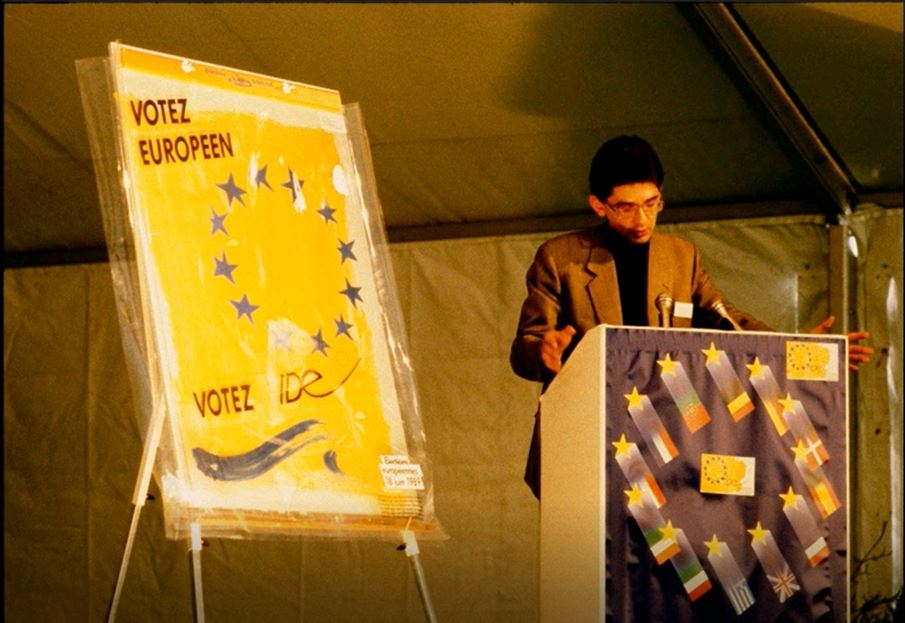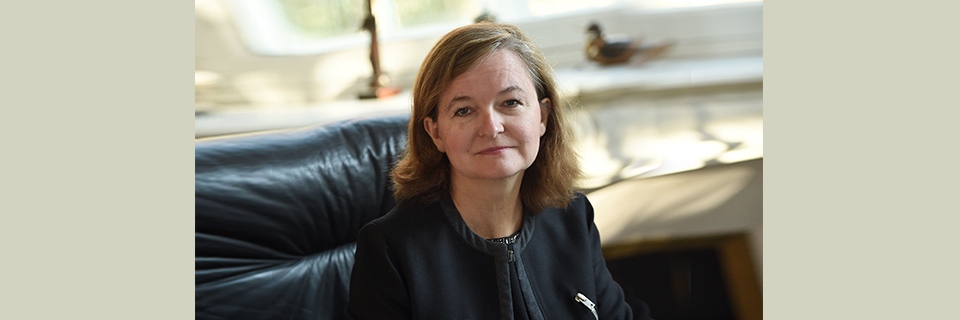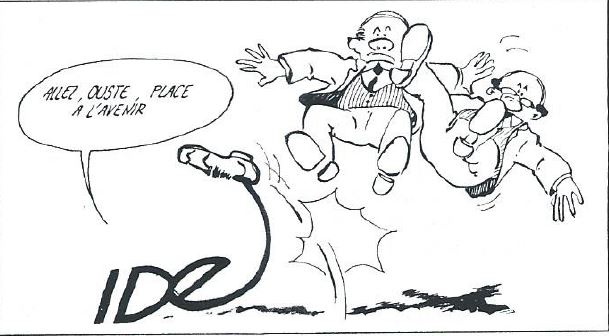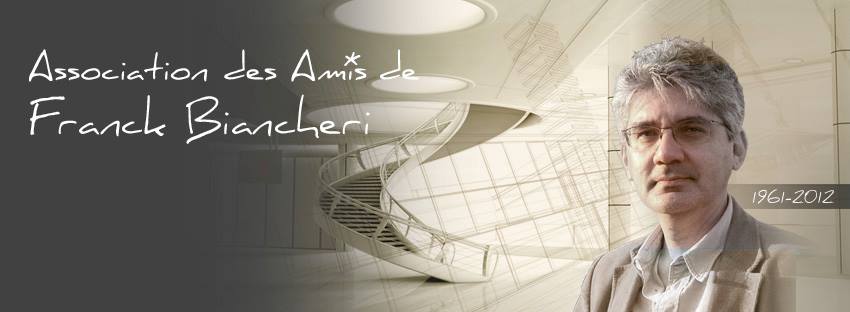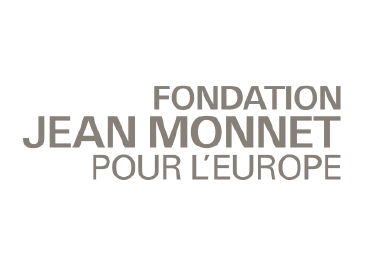[:en]The French mass media has recently found out that Nathalie Loiseau, head of the “Renaissance” political list of LaREM Party (La République en Marche) running for the European elections of May 2019, had already been a candidate before. Indeed, in 1989, at the age of 24, she was on Franck Biancheri’s list, namely on IDE (Initiative for European Democracy), the first trans-European political party. IDE was long time before Newropeans 2009, before DiEM25, before Volt, to mention only a few of the best known similar lists.
This focus on the electoral and political history of Nathalie Loiseau actually challenges us, as it highlights Franck Biancheri and his fundamental and founding role in the history of European democracy, since he created AEGEE-Europe (EGEE at the time), his major role in the existence of the ERASMUS programme, the creation of the first trans-European political parties (IDE and Newropeans2009) and the very first European citizens think tanks (Prometheus-Europe, Europe2020, Tiesweb, Leap2020 ).
Nathalie Loiseau mentioned as well the role Franck Biancheri played throughout his whole life: “I knew Franck thanks to EGEE, then IDE. Franck was a true disseminator. His ideas have disseminated and he left deep traces in each of us. If his death was a shock, let’s make sure to carry on his work, for Europe needs his intellectual heritage … “ (In Memoriam 2012)
If we go back to the articles recently published about Nathalie Loiseau’s electoral past (see below), the AAFB Association (whose main aim is to defend, promote and carry on Franck Biancheri’s memory since he died prematurely in 2012 at the age of 51) is providing the following elements to contextualise the aforementioned items of information.
The experience of those young visionaries in 1989 was not a “failure” but a pioneering act!
IDE, the first trans-European political party in the history of European democracy, was created in 1987 by Franck Biancheri (at that time he was 26 years old), when he left the presidency of AEGEE-Europe, a European student forum (with no national levels) which he had founded in 1985.
IDE campaigned throughout the European Community for the elections of June 1989 (beach campaigns in summer 1988 in particular) under the same name, with the same programme, and based on a single decision-making assembly (Agora) and it brought together all the European members of the party with no national level and lists presented in Spain, France and the Netherlands (it missed its presence in West Germany by a few signatures only).
IDE was both a historic and a democratic challenge at a time when:
- The internet did not exist (no website, no blog, no email, no search engines, no wikipedia to know how election procedures work in the 12 different European countries…)
- The mobile phone did not exist (no chats, no SMS, just land phone with international fares (not even European fares available))
- Social networks did not exist (meetings occurred all over Europe)
- Low-cost transportation in Europe barely existed (Eurolines was launched in 1985)
- European media coverage did not exist (national media)
- Simultaneous translation tools did not exist (IDE had translated campaign documents into six languages (German, English, Spanish, French, Italian, Dutch) and all internal and external communications were bi- or even trilingual)
- The young European politicians did not exist (the European elections accepted only the political parties of the establishment and the old politicians; also those who had lost their regional / national mandate got into the European elections as a compensation for their loss…) The average of the IDE list’s age was 28, composed of students or young professionals
- The idea of trans-Europeanisation did not exist (at most, in the Brussels circles ideas of “federalism” and “of the United States of Europe” were heard)
- The European citizen did not exist … First point of the Manifesto for the second European Renaissance of IDE was: “The community has institutions, but it has no citizens.“
Check below the communication means of IDE, a young political party without any financial support:
- The European network of its members, constituted in all the EEC countries, and their high mobility by road transportation (Eurolines, inter-rail, but also by cars…)
- Minitel! that allowed to create the first IDE campaign site “36.16 OSI * IDE” and that the IDE members exported to Germany, Spain, Netherlands for the needs of the electoral campaign
- The fax machine at the time was booming and was much cheaper than the phone, which allowed to send what IDE called the “info-fax” documents.
Something specific to France, at the time (and this has not changed ever since, unfortunately), the campaign costs were taken in charge by the political parties themselves (the signatures docs, the campaign posters, the ballot papers + their routing to the 70,000 polls or more and the survey that these ballots were present on the tables of the polling stations… the whole of the communication, media coverage.. of which reimbursement is only granted to political parties reaching the 5% threshold), knowing that the already represented political parties had received financial aid from the state to cover the campaign costs… In 1989, IDE’s campaign cost was covered by its members, the majority being students who even asked for personal loans…
The young IDE members were utopic, certainly, but not naive
IDE was not conceived as a political machine to win elections or a few seats in the parliament but as an experiment, an innovation in the European political and democratisation process, a seed for a “united and open political world” worrying about the “revival of nationalism throughout the Community” (IDE press release against “national-partism”…), a finger pointed towards a horizon of democratic Europe … whereas everyone looked at the finger… and still does that today, apparently.
Nathalie Loiseau was one of the candidates on the list presented in France and led by Franck Biancheri. (see the list of candidates for France). In this respect, just like the other 80 candidates on the same list and those of the Spanish and Dutch lists, Nathalie Loiseau does belong to this generation of pioneers of European democracy; she was part of the history of democratic Europe…
Thirty years later, except for the Newropeans party in 2009 (a second political movement created by Franck Biancheri), no other political party can claim to have taken up the challenge and path of trans-Europeanism.
We feel proud and happy to see politicians, like Nathalie Loiseau, coming from this “European democracy school”, engage in this European campaign to try, faithful to their youth convictions, to consolidate this Europe on democratic bases and provide the already emerging generations a solid foundation to rely on and address the global issues characterising their project.
So hopefully, with Nathalie Loiseau and many others, this Europeanisation of European citizens will happen. Let’s try to hear through the sputtering of national radio speeches of transnational political parties like DiEM25 or Volt, taking methods and ideas developed by Franck Biancheri thirty years before: let’s hear “Europeans speak to Europeans”.
———
For your consultation:
The results:
- France: 0.17% (https://fr.wikipedia.org/wiki/%C3%89lections_europ%C3%A9ennes_de_1989_en_France)
- Spain: 8,789- 0.0% (https://en.wikipedia.org/wiki/1989_European_Parliament_election_in_Spain)
- The Netherlands: 23,298 – 0.4% (https://en.wikipedia.org/wiki/1989_European_Parliament_election_in_the_Netherlands)
The articles:
- Nathalie Loiseau a déjà été candidate aux Européennes (et ça ne s’est pas bien terminé) – Huffington Post, 25/03/2019
- Liste LREM aux européennes : 5 choses que vous ignorez sur Nathalie Loiseau, Le Parisien, 25/03/2019
- Nathalie Loiseau : pro-GPA, catholique… Le profil étonnant de la candidate LREM, L’Internaute, 04/04/2019
- Nathalie Loiseau a-t-elle été à l’origine du programme Erasmus, Ouest-France, 04/04/2019
To avoid any confusion, we draw our readers’ attention to the AAFB press release on Gefira against the hijacking of the websites Newropeans-Magazine.org and Newropeans, fraudulently recovered and diverted from their purpose: Not in the name of Franck Biancheri, AAFB, 10/09/2017 – To know more about Newropeans, consult us: info@franck-biancheri.eu
[huge_it_gallery id=”13″][:fr]Les médias français ont découvert récemment que Nathalie Loiseau, tête de la liste “Renaissance” du parti LaREM (La République en Marche) pour les élections européennes de mai 2019, avait déjà été candidate aux élections européennes. Effectivement, en 1989, à l’âge de 24 ans, elle était sur la liste de Franck Biancheri, Initiative pour une Démocratie Européenne (IDE), le tout premier parti politique transeuropéen, avant Newropeans2009, avant DiEM25, avant Volt, pour ne citer que les plus (re)connus.
Ce focus sur l’histoire électorale et politicienne de Nathalie Loiseau nous interpelle en premier lieu, puisqu’elle met en lumière Franck Biancheri et son rôle fondamental et fondateur dans l’histoire de la démocratie européenne, depuis la fondation de AEGEE-Europe (EGEE à l’époque), son rôle majeur dans l’existence du programme ERASMUS, la création des tous premiers partis politiques transeuropéens (IDE et Newropeans2009) et celle des tous premiers think-tanks citoyens européens (Prometheus-Europe, Europe2020, Tiesweb, Leap2020).
Nathalie Loiseau a d’ailleurs rappelé le rôle que Franck Biancheri a joué durant toute sa vie: “J’ai connu Franck par EGEE, puis IDE. Franck était un semeur. Ses idées ont germé et il laissé une trace profonde en chacun d’entre nous. Si son décès est un choc, soyons attentifs à poursuivre son oeuvre; L’Europe a besoin de son héritage intellectuel. …” Déclaration à consulter dans la rubrique “In Memoriam 2012” du site de l’AAFB.
Pour revenir sur les articles qui ont été récemment publiés sur le passé électoral de Nathalie Loiseau (cf ci-dessous), l’AAFB, dont l’objet est la défense et la transmission de la mémoire de Franck Biancheri, décédé prématurément en 2012 à l’âge de 51 ans, souhaite apporter les éléments suivants pour permettre de contextualiser les informations diffusées.
L’expérience menée par ces jeunes visionnaires en 1989 n’était pas « ratée » mais pionnière !
IDE est le tout premier parti politique transeuropéen de l’histoire de la démocratie européenne créé en 1988 par Franck Biancheri (à l’époque âgé de 27 ans), alors qu’il quittait la présidence d’AEGEE-Europe, réseau d’étudiants transeuropéen (sans niveau national) qu’il avait fondé en 1985.
IDE a fait campagne dans toute la Communauté européenne (campagne des plages en été 1988 notamment) sous le même nom, avec le même programme, une seule assemblée décisionnaire (Agora) qui réunissait tous les membres européens du parti sans niveau national, et a présenté des listes en Espagne, France et Pays-Bas (ratant de quelques signatures sa présence en Allemagne fédérale – de l’ouest) pour les élections de juin 1989.
IDE était un défi historique et un défi démocratique à une époque où,
- l’internet n’existait pas (pas de site, pas de blog, pas de mail, pas de moteurs de recherche, pas de wikipedia pour savoir comment fonctionnaient les procédures électorales dans les 12 pays européens…),
- le téléphone portable n’existait pas (pas de tchats, pas de sms, juste des coûts téléphoniques internationaux (même pas de coûts européens)),
- les réseaux sociaux n’existaient pas (des réunions à travers toute l’Europe),
- les transports low-cost en Europe existaient à peine (Eurolines avait été lancé en 1985),
- la couverture médiatique européenne n’existait pas (médias nationaux),
- les outils de traduction simultanée n’existaient pas (IDE avait traduit en 6 langues les documents de campagne (allemand, anglais, espagnol, français, italien, néerlandais) et toutes les communications internes comme externes étaient bi- voire trilingues),
- les jeunes politiciens européens n’existaient pas (aux élections européennes n’étaient admis que les partis politiques de l’establishment et les vieux politiciens ou ceux qui avaient perdu leur mandat régional/national comme lot de compensation…) – la moyenne d’âge de la liste IDE était de 28 ans, composée d’étudiants ou jeunes professionnels (c’est d’ailleurs ce que relève l’article du Parisien: “Placée en 49e position de la liste hexagonale, Nathalie Ducoulombier (son nom de jeune fille) n’a aucune chance d’être élue face aux poids lourds de la droite et de la gauche.“)
- l’idée de transeuropéanisation de quoi que ce soit n’existait pas (tout au plus parlait-on dans les cercles bruxellois de « fédéralisme » et « d’Etats-Unis de l’Europe »),
- le citoyen européen n’existait pas… Premier point du Manifeste pour la seconde Renaissance européenne de IDE: “La communauté a des institutions. Mais elle n’a pas de citoyens.”
Les moyens de communication de IDE, alors tout jeune parti politique sans aucune ressource financière, ont été:
- le réseau européen de ses membres constitué dans tous les pays de la CEE, et leur grande mobilité via transports routiers (Eurolines, inter-rail, mais aussi les voitures…),
- le minitel ! qui a permis de créer sans doute le premier site de campagne: “36.16OSI*IDE” puis “36.15 IDE” et que les membres d’IDE ont exporté en Allemagne, Espagne, Pays-Bas pour les besoins de la campagne électorale,
- le télécopieur (fax) à l’époque en plein boom et bien moins cher que le téléphone, qui permettait de transmettre ce que IDE appelait les “info-fax”.
Spécifique à la France, à l’époque (et cela n’a pas changé malheureusement), les frais de campagne étaient à la charge des partis politiques eux-mêmes, c’est à dire, les professions de foi, les affiches de campagne, les bulletins de vote (+ leur acheminement auprès des plus de 70.000 bureaux de vote et la supervision que ces bulletins sont bien présents sur les tables des bureaux de vote… l’ensemble de la communication, couverture médiatique etc… dont le remboursement n’est acquis qu’aux partis politiques qui atteignent le seuil de 5%, sachant que les partis politiques déjà représentés reçoivent des subventions de l’état pour couvrir les frais de campagne)… En 1989, les frais de campagne de IDE ont pu être couverts grâce à ses membres, dont la majorité était des étudiants qui ont contracté des prêts personnels.
Utopiques les jeunes d’IDE certes, mais pas naïfs!
IDE n’avait pas été conçu comme une machine politique pour gagner des élections ou quelques sièges mais comme une expérience, une innovation dans le processus politique et de démocratisation européen, une semence pour une “Europe politique unie et ouverte sur le monde” qui s’inquiétait du “regain du nationalisme à travers toute la Communauté” (communiqué de presse IDE contre le “national-partisme” … ), un doigt tendu vers un horizon d’Europe démocratique… encore aujourd’hui semble-t-il on ne regarde que le doigt.
Nathalie Loiseau était candidate sur la liste présentée en France et menée par Franck Biancheri. (cf la liste des candidats français de IDE). A ce titre, tout comme les 80 autres candidats de cette liste et ceux des listes espagnoles et néerlandaises, Nathalie Loiseau appartient effectivement à cette génération de pionniers de la démocratie européenne, elle fait partie de l’Histoire de l’Europe démocratique…
Trente ans plus tard, à l’exception de Newropeans en 2009, l’autre mouvement politique créé par Franck Biancheri, aucun autre parti politique ne peut se targuer d’avoir relevé ce défi de la transeuropéanité et de ce parcours.
Nous ne pouvons que nous réjouir de voir des politiciens issus de cette « école de la démocratie européenne » s’engager dans cette campagne européenne pour tenter, fidèles à leurs convictions de jeunesse, de consolider cette Europe sur des bases démocratiques et fournir aux générations déjà émergentes un socle solide sur lequel elles pourront s’appuyer pour adresser les enjeux globaux qui caractériseront leur projet.
Espérons donc, autour de Nathalie Loiseau et de tant d’autres, cette européanisation des Européennes de mai prochain et tentons d’entendre au travers des crachotements des médias nationaux les discours de partis politiques transnationaux comme DiEM25 ou Volt, reprenant méthodes et idées développées quelques trente ans plus tôt par Franck Biancheri : « les Européens parlent aux Européens ».
———
A consulter:
Les résultats:
- France: 0.17% (https://fr.wikipedia.org/wiki/%C3%89lections_europ%C3%A9ennes_de_1989_en_France)
- Espagne: 8,789- 0.0% (https://en.wikipedia.org/wiki/1989_European_Parliament_election_in_Spain)
- Pays-Bas: 23,298 – 0.4% (https://en.wikipedia.org/wiki/1989_European_Parliament_election_in_the_Netherlands)
Les articles:
- Nathalie Loiseau a déjà été candidate aux Européennes (et ça ne s’est pas bien terminé) – Huffington Post, 25/03/2019
- Liste LREM aux européennes : 5 choses que vous ignorez sur Nathalie Loiseau, Le Parisien, 25/03/2019
- Nathalie Loiseau : pro-GPA, catholique… Le profil étonnant de la candidate LREM, L’Internaute, 04/04/2019
- Nathalie Loiseau a-t-elle été à l’origine du programme Erasmus, Ouest-France, 04/04/2019
Les références de l’AAFB:
- consulter les archives IDE sur le centre de Documentation Franck Biancheri
- IDE, Passeport pour l’Europe, la fiche d’identité de IDE (1988)
- Manifeste pour la Seconde Renaissance Européenne, IDE 1988/1989
- Communiqué de presse IDE contre le “national-partisme”: IDE-Communiqué de presse-National Partisme
Pour éviter toute confusion, nous attirons l’attention de nos lecteurs sur le communiqué de l’AAFB sur Gefira contre le détournement des sites Newropeans-Magazine.org et Newropeans, frauduleusement récupérés et détournés de leur objet: Pas au nom de Franck Biancheri!, AAFB, 10/09/2017 – Pour en savoir plus sur Newropeans, nous consulter: info@franck-biancheri.eu
[divider]
[huge_it_gallery id=”13″][:]
